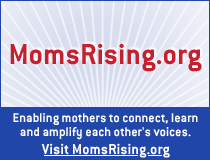|
Presidential Candidates: Moms and Newborns Need Paid Family Leave
By Nanette Fondas
On International Women's Day Saturday, I started thinking about moms around the world and then moms in our own United States of America. As the mother of four children, I've spent a lot of time over the years breastfeeding babies, and so I wondered: Why do moms in the U.S. still lack a guarantee of some paid maternity leave so they have time to bond with their bundles-of-joy? Why is the U.S. one of only four countries, of 170 surveyed, without paid leave for mothers following childbirth? (The other three are Papua New Guinea, Swaziland, and Lesotho).
Though it's a bit of a blur now, one thing I remember clearly is how LONG it takes to breastfeed, especially in an infant's first weeks of life. To be sure, I have exceedingly fond memories of the many hours I spent gazing at my babies (babies, yes! twins meant nursing two at once). But how many hours? It takes eight to ten hours per day to breastfeed a newborn. This important fact alone creates a need for a mother to take a break from work. Doctors, lactation experts, and even infant formula companies acknowledge that "breast is best." But how can a mother be successful in those early make-or-break days if she's working long hours, feeling pressured to get back to work quickly, or wondering how to make ends meet if she doesn't return fast because she has no paid time off?
According to a new study released just days ago by the U.S. Census Bureau, 49 percent of American mothers cobble together some sort of paid leave following childbirth by using a combination of sick days, vacation days, disability leave, and employer-provided maternity leave. The good news is that more employers are offering paid maternity leave as a job benefit. But the bad news is that a full 51 percent of new mothers lacked paid leave—so some took unpaid leave, some quit, and some even lost their jobs.
Not surprisingly, the college-educated mothers were most likely to have some paid leave, followed by high school graduates. Those without a high school diploma were least likely to have any paid leave. These results mirror other reports on workplace policies: Lower income workers are more likely to need workplace flexibility and less likely to have it because their jobs have the most rigid requirements. New mothers may qualify for unpaid leave under the Family Medical Leave Act (FMLA) but most cannot afford to take it.
Isn't it time to fix this? At MomsRising.org we think so, so this week our members are sending email to the leading Presidential candidates urging them, upon taking office, to make it a priority to pass national paid family leave. Click here to send one yourself. Let's get the U.S. out of the bottom of the pile of countries in support for mothers--tell them the newborns sent you.
Note: This article originally appeared at The Huffington Post.
Nanette Fondas is a writer, mother, and former professor of business administration. She is the author of numerous articles and research reports on the sociology of work, family, and management.

MomsRising.org is an organization working to build a truly family-friendly nation. Started in May, 2006, MomsRising uses the power of online organizing in coordination with grassroots activities and media outreach to educate the public about problems facing American families and to propose common sense solutions. MomsRising.org provides citizens with an opportunity to amplify their voices and to take their concerns to leaders who are in positions to implement real changes.
Find us and join us at MomsRising.org.
|
